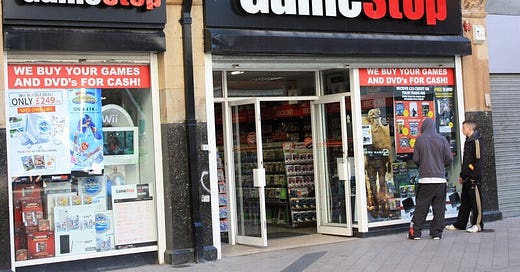Reddit’s short squeeze spree is very bad news
The system’s contradictions are wrecking capital allocation
Here it is: our GameStop take. It should take about five minutes to read. Let us know what you think, and if you like it, subscribe!
You don’t have to normally care about financial markets to find yourself obsessed with GameStop’s historic stock price explosion. At press time, Reddit had briefly forced its r/wallstreetbets (WSB) forum into a private mode, and Discord has censored its server to try and stop the frenzy. The rest of the market fell more than 2% as hedge funds and other major investors liquidated stocks to stave off insolvency crises -- their previous short positions threatened to consume them.
This is obviously extraordinary, but the story feels even bigger. Social media talkers all seem to sense that something is very wrong here, but what?
The disease beneath GameStop’s symptom: a series of interlocking contradictions fueling a rapid change in how capital gets allocated in this economy. This change in turn aggravates the biggest contradiction of all: the tension between how individual wealth seekers make their money in the short term and the system’s ability to reproduce itself for the long term. Releasing that tension could mean big disruptions to our way of life.
WSB and friends have run these stocks up through a short squeeze. They have enough action that by focusing on thinly traded (before this week) stocks, they can bid up their prices, forcing the short sellers who bet on the stock going down to “cover” fast to avoid losing huge sums. This mass buying bids the price up even further, forcing more shorts to cover, raising prices again and creating a feedback loop that sends prices vertical.
The main contradiction here is obvious: the stocks’ prices do not reflect their actual value. Value in this sense means the companies’ expected future cash flow from operations. If these businesses consistently make more money than they spend, they can do one of three things with their profits:
Buy more capital goods and hire more workers. More assets mean more value means stock in the business should be worth more too.
Return the money to investors by issuing a dividend.
Buy back stock, concentrating value into existing shares, raising their price.
Profitable companies make more money for stockholders, which makes their stock more valuable.
The idea of GameStop issuing a dividend in the foreseeable future is laughable. Its price move has nothing to do with how the company’s management has deployed its capital to generate future returns. It has everything to do with speculation -- bets that someone else will pay more for the stock later. WSB has used its volume to force some big investors to play the greater fool.
But if value is a material thing and not just a function of abstract prices, then speculation is a net loser for the economy. Speculative buyers channel capital -- i.e. the fruits of past value production -- into products less valuable than the capital. Rather than buying materials and hiring workers to add value to them, it gets squandered.
In a speculative market the promise of quick payouts leaves few individual players with the luxury of worrying about this collective downside. This then is a second contradiction -- both WSB and the shorts it is squeezing are speculators betting on price movements rather than investing in value creation. Short sellers are informed by the real-life conditions of these businesses, but their returns still come from hoping a greater fool will pay more now than the shorts will later.
WSB has the firepower to screw them because Robinhood and other popular trading platforms now offer zero commission trades, drawing millions of new punters into the retail trading market. How can they offer this service for free? Because their users are their product: they sell order flows to “market makers” -- big financial institutions that buy and sell large quantities of stock in order to help other parties make their trades. This is a third contradiction, between WSB’s minions and their brokers.
Market makers buy and sell shares at slightly different prices, pocketing this “spread.” Like all middlemen their service creates no value -- they consume capital, they do not create it.
So this week’s chaos is the creation of a parasite (market makers) on a parasite (WSB) on a parasite (short sellers) on a parasite (dying firms surviving on artificially cheap debt). Like all parasites, they thrive briefly on a host they can’t help but kill -- the financial system that is supposed to allocate investment capital into enterprises that reproduce and advance our society.
Obviously most people historically have been more exploited by this system than served, but now even past winners are losing. At least 100,000 small businesses have died in less than a year; the cash flowing into gimmick plays on dead stocks could have saved some of them. There’s no mechanism for delivering that capital to those enterprises, of course, but China is finding ways to save their small and micro businesses at the expense of major financial players. The United States can’t because it’s not a priority here.
Market dissidents have always said that eventually the contradiction between short-term individual cash grabbing and the system’s collective, long-term viability would force a fateful choice upon its rulers. Either they will intervene more and more into the business process to override narrow self interests, increasingly allocating resources on the basis of social need, or the present order will fly apart, unable to help anybody.
That choice is closing in on us now, it seems, and it looks like a squeeze we might not be able to cover.
Disclaimer
Our only investment advice: Long Techopalypse.
Contact us with questions, feedback, hot tips, or stories we might have missed.




